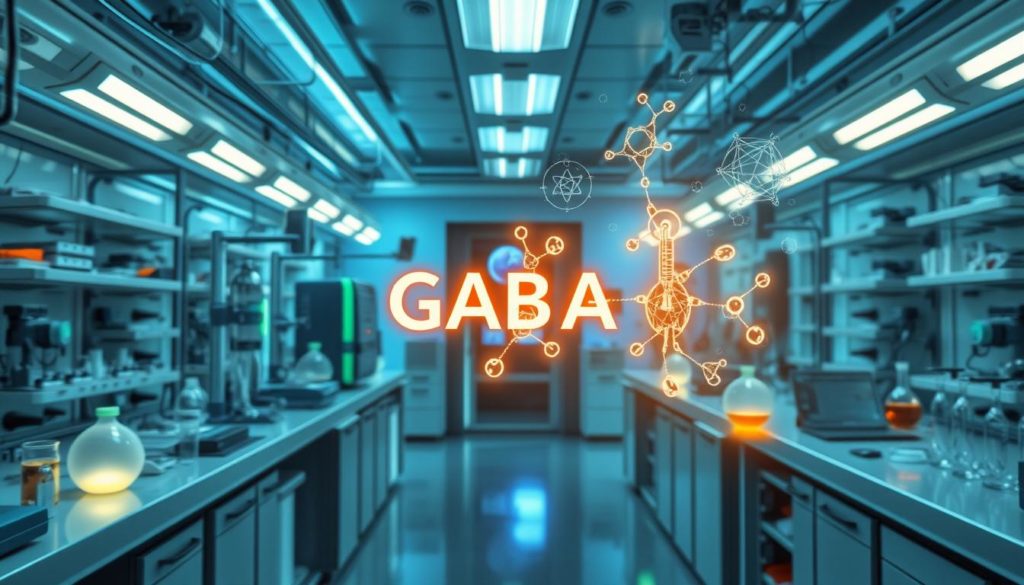About 40 million adults in the U.S. face anxiety disorders yearly. This shows a big need for natural ways to relax. GABA, a major neurotransmitter in the brain, plays a huge role in mental health and lowering stress.
GABA doesn’t just calm the mind; it helps in overall relaxation and mental health. If you’re fighting anxiety or need a natural stress reliever, GABA could be your answer. We’ll explore how GABA works, its impact on mental health, and how to use it to feel calmer.
Introduction to GABA and Its Importance
GABA, or Gamma-Aminobutyric Acid, is key in understanding brain chemistry and neural health. It’s the main inhibitory neurotransmitter in our brains. This means it plays a big part in calming the nervous system and keeping things stable.

What is GABA?
GABA is a natural amino acid working as a neurotransmitter in the brain. It controls neural activity by connecting to certain brain receptors, stopping nerve signals. This stops the brain from getting too excited. It also helps control muscle tone, keeping brain chemistry balanced.
Why GABA is Crucial for Mental Health
GABA does more than just calm us down. It’s vital for our brain’s health, touching on many functions that affect our mood, anxiety, and overall mental state. By blocking too much neural activity, GABA stops our brains from overreacting. This can prevent anxiety, depression, and other mental issues.
Without enough GABA, our brains can’t stay calm or stable. That makes GABA essential to understanding brain health and well-being.
The Science Behind GABA (Gamma-Aminobutyric Acid)
GABA is critical in our brain, influencing how we study neurotransmitters. It acts as the main inhibitory neurotransmitter, controlling neuron activity in our nervous system. This control helps keep things balanced and avoids too much stimulation.

At the cellular level, GABA ensures smooth communication between neuronal cells. It does this by attaching to GABA receptors. This action moderates nerve impulse transmission, allowing information to flow smoothly. Studies shed light on GABA’s impact on neuroplasticity, showing our brain’s ability to change with learning or after injury.
Recent discoveries underline the importance of GABA in our cognitive health. Researchers are looking at how changing GABA levels affect mood, anxiety, and brain function. The deeper we go into GABA research, the more we see its potential in new mental health treatments.
The table below summarizes some essential functions and effects of GABA on neuronal cell communication:
| Function | Effect |
|---|---|
| Inhibitory Functions | Reduces neuronal excitability, preventing overstimulation |
| Neuroplasticity | Facilitates the brain’s ability to adapt and reorganize |
| Mood Regulation | Influences mood stabilizing mechanisms and anxiety relief |
GABA Receptors and How They Work
GABA receptors are key in the brain’s neurotransmission control. They are specialized proteins on neurons. They help manage incoming excitatory signals, keeping neurons stable.
Types of GABA Receptors
There are two main types of GABA receptors: GABA A and B. Both are crucial for brain function. But, they work differently to control neural activity.
- GABA A Receptors: These receptors directly control ion channels as they are ionotropic. When GABA attaches to a GABA A receptor, it quickly lets chloride ions enter the neuron. This action rapidly reduces and calms neuron activity.
- GABA B Receptors: Unlike A receptors, GABA B receptors are metabotropic. They work through secondary messengers inside the cell. This leads to longer inhibitory effects. It helps control activities over an extended time.
The Role of GABA Receptors in the Brain
GABA A and B receptors play a vital role in the brain. They are essential for lowering neuron excitability and keeping our thinking stable. By adjusting neurotransmission, they ensure neural circuits work well. This prevents too much excitement that could cause conditions like epilepsy.
It’s critical to understand how GABA receptors function. This knowledge helps in creating drugs that target specific neurotransmission parts. Drugs that act on these receptors are used for their calming, anti-anxiety, and muscle-relaxing effects. These qualities make them important for treating different neurological issues.
| Type of Receptor | Function | Example |
|---|---|---|
| GABA A | Ionotropic, fast-acting inhibitory effects | Benzodiazepines |
| GABA B | Metabotropic, slow-acting inhibitory effects | Baclofen |
GABA as a Neurotransmitter
Gamma-Aminobutyric Acid (GABA) is key in the brain, ensuring neurons don’t get too excited. It helps keep our nervous system in check. By controlling neuron communication, GABA supports our ability to think clearly and stay calm.
How GABA Functions as a Neurotransmitter
GABA works by attaching to neuron surfaces. When it bonds with its receptors, neuron activity slows down. This is crucial for controlling brain excitement levels. Thanks to GABA, our brains work well without getting overwhelmed.
Impacts of GABA on Neuronal Activity
GABA plays a big role in keeping neural circuits stable. This helps lower the chances of brain disorders. Without the right GABA levels, people might experience anxiety, depression, or epilepsy. Keeping GABA balanced is essential for our brain’s health and our mental state.
GABA Benefits for Anxiety Relief
GABA is key for easing anxiety. It’s backed by science that shows how it helps calm the brain. Let’s explore the proof of its effects and how it works to bring peace.
Scientific Evidence Supporting GABA for Anxiety
Studies have found strong links between GABA and anxiety relief. For example, a piece in the Journal of Clinical Psychiatry showed folks with anxiety have less GABA. Also, taking extra GABA can really reduce anxiety signs. This points to its value in treatment.
How GABA Helps Calm the Mind
GABA makes the mind less hectic by slowing down nerve activity. When GABA attaches to its spots, it makes neurons less excitable. This keeps the brain from getting too worked up and aids in relaxation. Knowing how GABA works could lead to new ways to treat anxiety.
In short, adding GABA to treatment plans is a promising way to tackle anxiety. Its ability to calm the brain has been well proven.
GABA Supplementation: What You Need to Know
GABA supplementation is gaining popularity as a natural mental health remedy. It’s vital to know the different supplement types, dosing, and side effects. This information will help if you’re thinking about GABA.
Types of GABA Supplements
GABA comes in capsules, tablets, powders, and gummies. Brands like Nature’s Way, NOW Foods, and Pure Encapsulations offer them. It’s key to pick a product that suits your lifestyle while checking its quality.
Effective Dosages for GABA Supplements
There’s no universal dose for GABA supplementation. Needs vary, so does the effect people want. A starting point could be 500 mg daily. If needed, this might increase to 1500 mg. Always consult a healthcare provider for advice tailored to your needs.
Potential Side Effects of GABA Supplements
GABA supplements are generally safe but come with possible side effects. These include drowsiness, tingling, or stomach issues. To stay safe, follow dosing advice and talk to a doctor before starting. For further details, the Cleveland Clinic offers an insightful article on GABA.
| Supplement Form | Average Dosage | Common Brands |
|---|---|---|
| Capsules | 500-1500 mg/day | Nature’s Way, NOW Foods |
| Tablets | 500-1500 mg/day | Pure Encapsulations, Solgar |
| Powders | 500-1500 mg/day | Kaged, BulkSupplements |
| Gummies | 500-1500 mg/day | Olly, Viteey |
Natural Ways to Boost GABA in the Brain
To boost GABA levels in your brain, make changes to your diet and lifestyle. Focus on choices that benefit your overall health. Both what you eat and how you handle stress affect your brain’s chemistry a lot.
Dietary Sources of GABA
Adding foods rich in GABA to your diet can improve your mental health. Here are some top options:
- Fermented Foods: Kimchi, miso, and tempeh are great for this.
- Whole Grains: Foods like brown rice, barley, and oats help with GABA.
- Seafood: Shrimp and mackerel have a lot of GABA.
- Vegetables: Spinach, broccoli, and kale are full of important nutrients and GABA.
Eating these foods often can naturally boost your brain’s health.
Lifestyle Changes to Enhance GABA Production
Healthy lifestyle changes can also raise your GABA levels. They do this by lowering stress and improving your well-being.
- Meditation: Regular meditation can increase GABA by decreasing stress and helping you relax.
- Exercise: Physical activities, like yoga, can also up your GABA levels.
- Sleep Hygiene: Good sleep is key for brain health. Try to get 7-9 hours of quality sleep every night.
These methods boost GABA and help manage stress well. They keep your mind calm and balanced.
The Connection Between GABA and Better Sleep
To get better sleep, it’s key to know how GABA relates to sleep. GABA is important for controlling sleep because it calms and soothes.
GABA’s Role in Sleep Regulation
GABA is a brain chemical that reduces nerve activity, leading to relaxation and calm. This helps regulate sleep. People with high GABA levels fall asleep quicker and sleep well all night. Research suggests GABA also aids those with sleep problems by quickening the sleep process.
Improving Sleep Quality with GABA
Boosting GABA naturally can greatly improve sleep and health. GABA supplements might help those with sleep issues. By adjusting brain GABA levels, one might enjoy better and more restoring sleep.
Research backs up GABA supplements for treating sleep issues. They cut down the time to fall asleep and extend sleep duration. This makes them a good option besides usual sleep aids.
Here’s a quick look at natural sleep aids and their sleep benefits:
| Supplement | Main Benefit | Influence on Sleep |
|---|---|---|
| GABA | Calmness | Improves sleep quality, reduces latency |
| Melatonin | Regulates sleep cycle | Helps fall asleep faster |
| Valerian Root | Relaxation | Promotes deeper sleep |
| L-Theanine | Reduces stress | Improves sleep quality |
Comparing GABA with Other Calming Supplements
When looking at holistic wellness, comparing supplements is key. We focus on GABA, 5-HTP, and L-Theanine. They are known for aiding relaxation and mental calmness.
GABA vs. 5-HTP
GABA acts as an inhibitory neurotransmitter, easing nervous system activity. 5-HTP, on the other hand, boosts serotonin, which can improve mood and sleep. GABA calms the mind directly, while 5-HTP works by increasing serotonin levels. Both have their benefits, making them complementary in improving wellness.
GABA vs. L-Theanine
L-Theanine, found in green tea, promotes relaxation without making you sleepy. It reduces stress and anxiety like GABA and also boosts alpha brain wave activity. This leads to calm alertness. GABA and L-Theanine both aid in stress relief, but L-Theanine also helps keep focus and clarity.
Benefits of Combining GABA with Other Supplements
Mixing GABA with other supplements can increase benefits. Using GABA with L-Theanine improves focus and reduces stress, for balanced calmness and alertness. Likewise, GABA plus 5-HTP supports calmness and mood. This makes a well-rounded approach to wellness possible.
GABA and Mood Stabilization
Gamma-Aminobutyric Acid (GABA) is key in keeping our mood stable. It is especially important for people with bipolar disorder and depression. GABA works by slowing down brain signals. This helps keep brain activity balanced, which is vital for a stable mood.
Without this balance, people can experience sudden and intense mood changes. These are common in mood disorders.
How GABA Helps Balance Mood
GABA helps keep our mood even by causing relaxation. It stops neural circuits from being too active. When GABA attaches to its receptors, it prevents sudden nerve signals. These signals can cause anxiety and mood swings.
For people with bipolar disorder, GABA can help manage the extreme ups and downs. It encourages a more steady emotional state. For those with depression, GABA’s soothing effect can make depressive episodes less severe.
Studies on GABA and Mood Disorders
Many studies have focused on GABA and mood disorders. They show that people with depression often have less GABA in their brains. Increasing GABA, or making more naturally, can improve their mood and lessen symptoms. Clinical trials on bipolar disorder show that managing GABA levels can help control mood fluctuations. This is a hopeful direction for new treatments.
The science world is still looking into how GABA helps with mood stabilization. This research gives hope for better treatments for bipolar disorder and depression. It aims to better understand GABA’s role in emotional balance and find more effective ways to treat mood disorders.
Personal Experiences and Testimonials with GABA
Many people have shared their stories about using GABA to better their mental health. These user experiences come from forums and health blogs. They highlight the positive changes from taking GABA supplements. A common benefit mentioned is a decrease in anxiety. People feel more relaxed and focused, which improves their daily activities. Some have added GABA-rich foods to their meals and noticed better wellbeing over time.
Improving sleep is another big topic among user experiences with GABA. Those with sleep problems have tried GABA in hopes of getting better sleep. The results vary—some report a big improvement, while others only see slight changes. A review of 14 studies supports these mixed outcomes, showing that GABA might help but more research is needed. You can read more about this here.
GABA also gets praise for helping with mood stabilization, according to many GABA reviews. People say it helps manage their mood swings and keeps their mood steady. This matches scientific views on GABA’s role in mood-related neurotransmitter activities. However, these stories also highlight that results can differ greatly from person to person. These personal stories add to our overall understanding and provide insight for those thinking about trying GABA for mental wellness.
FAQ
What exactly is GABA?
GABA stands for Gamma-Aminobutyric Acid. It’s a neurotransmitter in the brain. It helps to make you feel relaxed and calm.
How does GABA help with anxiety?
GABA calms the neurons in the brain. This helps reduce anxiety and brings about a feeling of peace.
Are there different types of GABA receptors?
Indeed, there are different types. The GABA A and GABA B receptors are the main types. They manage how the nervous system responds to stimuli.
Can GABA improve sleep quality?
Yes. GABA can help you sleep better due to its sedative properties. It makes it easier to drift off and stay asleep.
What are the potential side effects of GABA supplements?
GABA supplements can cause drowsiness, stomach upset, and muscle weakness in some cases. Always talk to a healthcare provider before you start taking them.
How can I naturally boost GABA levels in my brain?
To naturally boost GABA, eat foods rich in GABA or its precursors. Practice regular exercise, yoga, or meditation for better GABA production.
Is there scientific evidence supporting the use of GABA for anxiety relief?
Yes, there’s evidence. Many clinical studies show GABA can reduce anxiety symptoms by calming the nervous system.
What are some good dietary sources of GABA?
GABA is in fermented foods like kimchi, yogurt, and tempeh. It’s also in green and black teas. Whole grains, nuts, and seeds are good too for boosting GABA.
How does GABA function as a neurotransmitter?
GABA works by regulating brain cell communication. This prevents overexcitement and keeps the nervous system in balance.
Can GABA be combined with other supplements?
Yes, it can be paired with calming supplements such as 5-HTP and L-Theanine. These combinations enhance relaxation and mental well-being even more.


